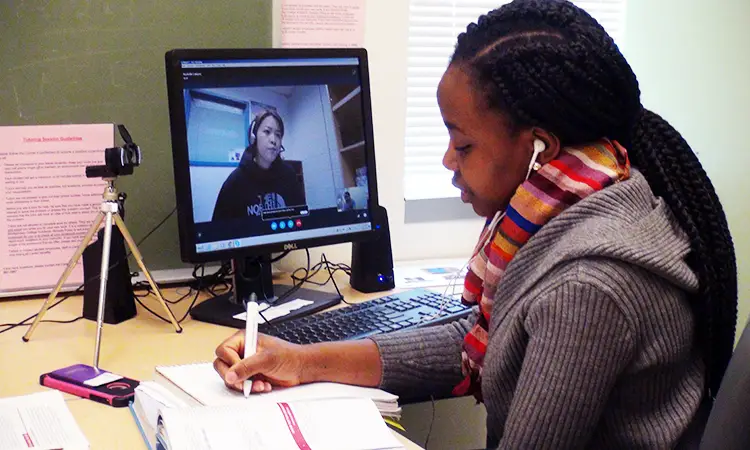As someone who has recently begun the juggling act, I can vouch that it is possible to be a full-time college student and work a remote job. Remote jobs allow schedule flexibility and also present the opportunity to work in comfortable, familiar settings, thus eliminating the pesky need to leave the comforts of home and travel through the various obstacles of the outside world to commute to work.
While remote jobs can be more convenient, it is important to know that not every remote job is the same. Some jobs require more time or different skill sets than others, so selecting the right job for your specific situation is important. You wouldn’t suddenly jump into becoming a vlogger if you aren’t a good talker or struggle to create fun content. No, you have to know what works best for you.
Like most online work, the pay varies from company to company, from assignment to assignment and from profession to profession, but the ability to set one’s own schedule helps in making the decision to go virtual. Here are three remote jobs that college students should consider applying for.
1. The Virtual Tutor
In tutoring, it is vital to know how to explain things well so that someone else can not only see their mistake, but understand how to avoid or fix it in future. As education has stepped into the realm of the virtual, online tutoring has also become more prevalent. Like regular tutoring, the tutor simply needs to be versed in the particular topic the learner needs help in. There are many levels of education, which provides the opportunity to tutor nearly every age group available.

Online tutoring can involve video chats or emails and instant messages. Learners send in their finished assignments or questions, and the tutor can review the assignments and questions, provide feedback and send detailed explanations to the learner.
For example, if a student sends in an essay and needs help on the introduction and thesis, the tutor would focus comments on how to strengthen both areas and offer examples so the learner can understand how to improve their own work. In this way, the tutor provides the necessary services without ever having to leave the comfort of home, and the learner also keeps his or her valuable time instead of having to rush off to a session.
Many online tutoring companies offer the option of live tutoring sessions. Brainfuse, a company founded in the year 1999 and based in New York, offers both assignment-based work and live sessions. As an employee working at Brainfuse, the tutor picks from various subjects they feel knowledgeable in and assignments from the selected subjects will appear in the tutor’s inbox. Every tutor in the same subject will have access to the assignment, so it is done through the first-come, first-serve method—and that makes it competitive. But, because of the hour flexibility, it also makes Brainfuse a company to consider working for.
2. The Editor: College Student Edition
Unlike online tutoring, remote editing is a little more hands-on, since the employee needs to be able to not only catch mistakes but be able to correct them properly as well—and that is only if simple grammar and technical issues are the main focus. Editing and proofreading tend to go hand-in-hand and require English language skills, depending on the company and the clientele, so some companies may need editing for more than just grammar usage or mechanics.
If assignments are simply editing for grammatical errors, then the time needed for work might not be as long. Knowing the difference between there, their and they’re already gives some potential employees a leg-up—same with to, too and two. As an editor and tutor, I’ve witnessed too many students mixing up these words.

If the company calls for a content editor, the potential employee needs more than basic English language skills, as he or she may need to be creative, innovative and resourceful. If you’re working for a media company and the language of the piece is boring and dry, the employer would expect the content editor to spice up the wording and sentence structure. If you’re editing work for a student and the body paragraphs do not match the information in the thesis, the student would want to know how to better align the body paragraphs to support the thesis and may want you to begin the process.
Online jobs can be competitive, and that even goes for online editing. Top sites, such as Amazon or Verizon, require hawk eyes and English skills to help draw the attention of potential clients. Of course, this means being adept in reading and writing, skills which will separate the potential employees from the future employees. If you are an avid reader and writer, you should consider remote editing.
3. The Online Transcriber
Transcribing requires good listening skills. To transcribe, one records what is being said in writing. Typically, transcribing is done for audio clips so people can follow along if they are unable to fully understand what is being said in the clip. Becoming a transcriber, at some companies, requires taking a test as a part of the application process. The test is usually an audio clip with one or more speakers and the test-taker is provided with a style guide on which to base his or her work.
For this job, listening skills aren’t the only requirement; you also need to be able to write. As a transcriber, the hardest part comes in the form of inaudible murmuring. Sometimes, a three-minute audio clip takes over fifteen minutes to transcribe, because you’re working to make sure you have every single word uttered. You may end up playing the clip close to a hundred times just to be sure you caught it all and made no mistakes in your own spelling or sentence format.
CastingWords and Rev.com are two companies known for their transcribing services. Both of these companies test their applicants at the end of the application process, and if the test is failed, both companies have an allotted time you must wait before you can take the test again. Once passed though, the employee is able to start work immediately and can choose the assignments that they take on.

















